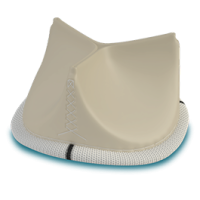After warning healthcare providers earlier this year that its line of Trifecta replacement heart valves may begin to deteriorate sooner than expected, Abbott has now announced that it will be pulling them from the market entirely.
The company said it would discontinue production of the bioprosthetic aortic valves and will collect any unused hardware from hospital inventories. Abbott also said it will continue working with the FDA to monitor patients that have already received the implants.

Constructed out of animal tissue to avoid causing calcification and blood clots, the Trifecta valves had been expected to last at least a decade. However, in late February, both the FDA and Abbott notified users that studies had pointed toward higher rates of device failures within the first five years when compared to other bioprosthetic valves.
According to the company, the majority of early deteriorations hinge on a tear in at least one of the implant’s leaflets, while cases after five years have largely been linked to calcification and hardening of the valve. These can lead to additional surgeries to remove and replace the failing valve as well as patient injury or death.
The first-generation Trifecta valve received FDA approval in 2011; it was later superseded by the Trifecta GT, which gained a green light in 2016. Abbott picked up the portfolio through its $25 billion acquisition of St. Jude Medical in 2017.
In its July 31 letter to customers, Abbott said the assessments of risk have not changed since its February notice. The FDA has recommended that Trifecta patients undergo annual follow-ups with ultrasound exams to check on the function of the heart valve.
In the meantime, Abbott has secured approval for the latest in its Epic family of bioprosthetic aortic valves. The company received an FDA green light in March for the stented, tissue-based Epic Max—which, like the Trifecta, is designed to be placed through an open heart procedure compared to a transcatheter approach.